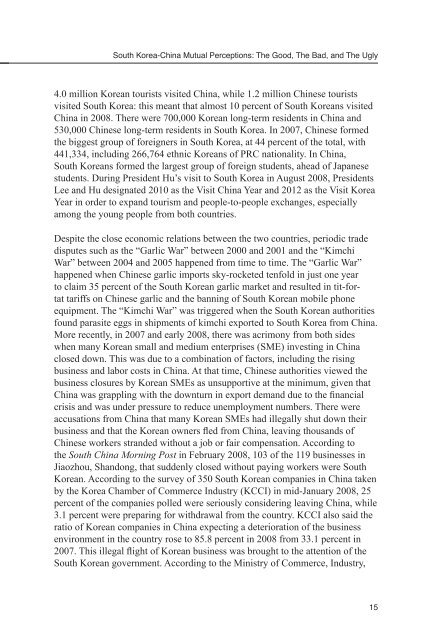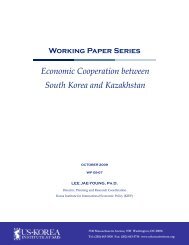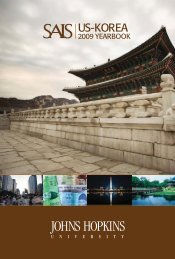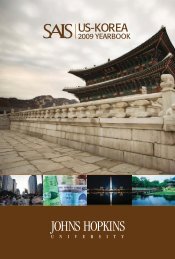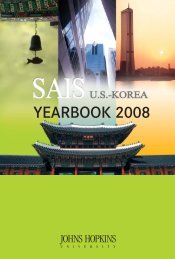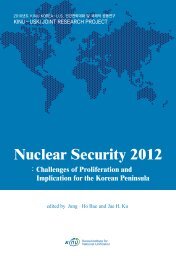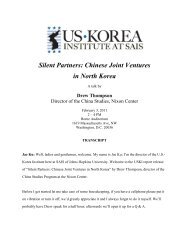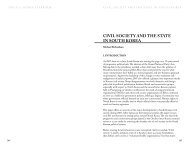US-Korea Institute at SAIS
US-Korea Institute at SAIS
US-Korea Institute at SAIS
- No tags were found...
You also want an ePaper? Increase the reach of your titles
YUMPU automatically turns print PDFs into web optimized ePapers that Google loves.
South <strong>Korea</strong>-China Mutual Perceptions: The Good, The Bad, and The Ugly<br />
4.0 million <strong>Korea</strong>n tourists visited China, while 1.2 million Chinese tourists<br />
visited South <strong>Korea</strong>: this meant th<strong>at</strong> almost 10 percent of South <strong>Korea</strong>ns visited<br />
China in 2008. There were 700,000 <strong>Korea</strong>n long-term residents in China and<br />
530,000 Chinese long-term residents in South <strong>Korea</strong>. In 2007, Chinese formed<br />
the biggest group of foreigners in South <strong>Korea</strong>, <strong>at</strong> 44 percent of the total, with<br />
441,334, including 266,764 ethnic <strong>Korea</strong>ns of PRC n<strong>at</strong>ionality. In China,<br />
South <strong>Korea</strong>ns formed the largest group of foreign students, ahead of Japanese<br />
students. During President Hu’s visit to South <strong>Korea</strong> in August 2008, Presidents<br />
Lee and Hu design<strong>at</strong>ed 2010 as the Visit China Year and 2012 as the Visit <strong>Korea</strong><br />
Year in order to expand tourism and people-to-people exchanges, especially<br />
among the young people from both countries.<br />
Despite the close economic rel<strong>at</strong>ions between the two countries, periodic trade<br />
disputes such as the “Garlic War” between 2000 and 2001 and the “Kimchi<br />
War” between 2004 and 2005 happened from time to time. The “Garlic War”<br />
happened when Chinese garlic imports sky-rocketed tenfold in just one year<br />
to claim 35 percent of the South <strong>Korea</strong>n garlic market and resulted in tit-fort<strong>at</strong><br />
tariffs on Chinese garlic and the banning of South <strong>Korea</strong>n mobile phone<br />
equipment. The “Kimchi War” was triggered when the South <strong>Korea</strong>n authorities<br />
found parasite eggs in shipments of kimchi exported to South <strong>Korea</strong> from China.<br />
More recently, in 2007 and early 2008, there was acrimony from both sides<br />
when many <strong>Korea</strong>n small and medium enterprises (SME) investing in China<br />
closed down. This was due to a combin<strong>at</strong>ion of factors, including the rising<br />
business and labor costs in China. At th<strong>at</strong> time, Chinese authorities viewed the<br />
business closures by <strong>Korea</strong>n SMEs as unsupportive <strong>at</strong> the minimum, given th<strong>at</strong><br />
China was grappling with the downturn in export demand due to the financial<br />
crisis and was under pressure to reduce unemployment numbers. There were<br />
accus<strong>at</strong>ions from China th<strong>at</strong> many <strong>Korea</strong>n SMEs had illegally shut down their<br />
business and th<strong>at</strong> the <strong>Korea</strong>n owners fled from China, leaving thousands of<br />
Chinese workers stranded without a job or fair compens<strong>at</strong>ion. According to<br />
the South China Morning Post in February 2008, 103 of the 119 businesses in<br />
Jiaozhou, Shandong, th<strong>at</strong> suddenly closed without paying workers were South<br />
<strong>Korea</strong>n. According to the survey of 350 South <strong>Korea</strong>n companies in China taken<br />
by the <strong>Korea</strong> Chamber of Commerce Industry (KCCI) in mid-January 2008, 25<br />
percent of the companies polled were seriously considering leaving China, while<br />
3.1 percent were preparing for withdrawal from the country. KCCI also said the<br />
r<strong>at</strong>io of <strong>Korea</strong>n companies in China expecting a deterior<strong>at</strong>ion of the business<br />
environment in the country rose to 85.8 percent in 2008 from 33.1 percent in<br />
2007. This illegal flight of <strong>Korea</strong>n business was brought to the <strong>at</strong>tention of the<br />
South <strong>Korea</strong>n government. According to the Ministry of Commerce, Industry,<br />
15


